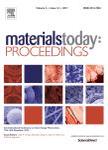版权所有:内蒙古大学图书馆 技术提供:维普资讯• 智图
内蒙古自治区呼和浩特市赛罕区大学西街235号 邮编: 010021

作者机构:Department of Information Engineering and Research Center "Enrico Piaggio" University of Pisa Pisa Italy Engineering Product Development Pillar Singapore University of Technology and Design Singapore
出 版 物:《Materials Today: Proceedings》 (Mater. Today Proc.)
年 卷 期:2022年第70卷
页 面:131-135页
核心收录:
学科分类:0810[工学-信息与通信工程] 1201[管理学-管理科学与工程(可授管理学、工学学位)] 08[工学] 0805[工学-材料科学与工程(可授工学、理学学位)] 080502[工学-材料学] 0835[工学-软件工程] 0812[工学-计算机科学与技术(可授工学、理学学位)]
基 金:The authors acknowledge the support of the Crosslab Additive Manufacturing and the Crosslab Cloud Computing Big Data & Cybersecurity of the Department of Information Engineering of the University of Pisa for the computational resources needed to train and evaluate the models. Moreover the authors acknowledge the financial support by the European Union’s Horizon 2020 research and innovation program under the project GIOTTO: "Giotto: Active ageing and osteoporosis: The next challenge for smart nanobiomaterials and 3D technologies". Finally the authors acknowledge the support of the University of Pisa project PRA mOSAIc: Open Source as key enabling approach for Artificial Intelligence in healthcare (PRA_2020_38).The authors acknowledge the support of the Crosslab Additive Manufacturing and the Crosslab Cloud Computing Big Data & Cybersecurity of the Department of Information Engineering of the University of Pisa for the computational resources needed to train and evaluate the models. Moreover the authors acknowledge the financial support by the European Union's Horizon 2020 research and innovation program under the project GIOTTO: "Giotto: Active ageing and osteoporosis: The next challenge for smart nanobiomaterials and 3D technologies". Finally the authors acknowledge the support of the University of Pisa project PRA mOSAIc: Open Source as key enabling approach for Artificial Intelligence in healthcare (PRA_2020_38)
摘 要:Quality control in extrusion-based bioprinting (EBB) represents a crucial step to: i) reduce the trial-and-error process and associated material consumption, ii) achieve standard results across different set-ups and laboratories to comply with relevant health standards, and iii) so accelerate the translation of Tissue Engineered products to more impactful clinical applications. In this context, machine learning algorithms represent a key enabling technology that is currently being explored in literature for quality control in EBB, thanks to their ability to learn relevant features from a training dataset and generalize to new, unseen data. In this work, we present a novel application of a deep learning model to EBB, namely a convolutional Long Short-Term Memory (LSTM) autoencoder, to extract a relevant quality measure from videos taken from a frontal view during the printing process. In particular, a comprehensive dataset was built by varying multiple printing parameters and using different EBB set-ups. The data was then used to train the model and validate it using videos containing different types of errors (i.e., under- or over-extrusion). Results highlight that the approach can effectively detect relevant extrusion-related problems in a proportional way to the error magnitude, and so can be applied as a quality control solution for the EBB process. © 2022